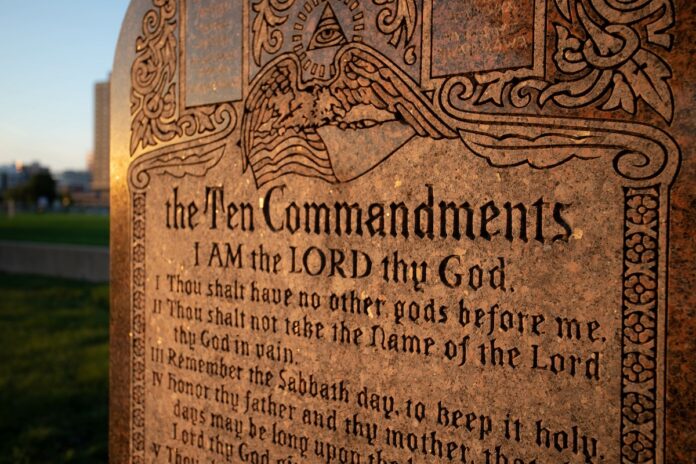
ATLANTA (Georgia Recorder) — Moses brought them down from Mount Sinai to the children of Israel, and now Gillsville Republican state Rep. Emory Dunahoo wants to bring them to all the children of Georgia.
It’s the Ten Commandments, and Dunahoo has a bill that would require all public schools to display copies of them in three locations: the main entrance, the library and the cafeteria, along with a text describing the history of the Ten Commandments in schools.
According to the book of Exodus, God gave the commandments to the Israelites as they were wandering the wilderness after escaping slavery in Egypt. Dunahoo, who comes from a family of teachers and coaches, said hopes House Bill 313 will help reverse troubling increases in student’s mental health problems and difficult family situations.

“I just thought, well, it’s time to kind of at least try to bring some good literature that we can look at that was biblically written, and Moses, when he wrote the Ten Commandments and God gave them to him, it was something just to follow as the people were in the wilderness,” Dunahoo said in an interview at the state Capitol. “Within our school systems, we’re not in the wilderness, but it seems like we’re going back there with all the things that are happening now. I just thought, no pun intended, just to basically put something good before our young people.”
Dunahoo said he would not have a problem with schools displaying modern translations of the Ten Commandments, though his bill calls for specific language similar to the old-fashioned English of the King James Bible.
“All it is is we put it in three places,” he added. “As they walk by, there’s something positive for them to look at, not to sit there and cram it down anybody’s throat, not to make them have to. I can walk by and look at anything in this Capitol I want to, I can walk by and pay no attention to it if I want to.”
That’s not likely to satisfy free speech advocates, who argue that requiring schools to post the commandments would violate the First Amendment’s protection from the government establishing a state religion.
“Attempting to indoctrinate children by mandating the display of a preferred religious text is completely inappropriate in Georgia’s public schools, where students of all faiths and backgrounds should feel equally welcomed in the classroom,” said Cory Isaacson, legal director for the American Civil Liberties Union of Georgia. “HB 313 also takes away parental authority, forcing specific beliefs onto kids without any consent by their parents. This is a terrible bill, and violates students’ First Amendment rights.”
U.S. 5th Circuit Court of Appeals judges are considering a case out of Louisiana with similar language to Georgia’s bill but that would require a copy of the Ten Commandments in every Louisiana classroom.
A Louisiana judge ruled in November that that state’s law violated the U.S. Constitution, but after an appeal from the state’s attorney general, that ruling only applies to five school districts that are among the defendants in that case. For the rest of the state, the law went into effect at the start of 2025.

Democratic state Sen. Kim Jackson, who is also an Episcopal priest, said she’s not a fan of requiring the commandments in Georgia schools.
“I understand the premise, which is that educating children on how we should treat one another is really important,” she said. “However, where we fall short is that the Ten Commandments are A, not universal teachings, and B, we have a really diverse group of children who sit in our classrooms every day, and they should not have to stare at texts that don’t represent their tradition, particularly religious texts.”
Jackson said people of all faiths agree with the virtues modeled in many of the commandments, such as not killing or stealing, but not all of the commandments may be seen as universal.
“Certainly people who are Hindu, people who have multiple gods, they certainly would take an affront to that particular language,” she said, referring to the commandment “Thou shalt have no other gods before me. “This language of honor your mother and father, when you talk to victims of incest, they struggle with that, as they should, right? And so those Ten Commandments, while I think they overarchingly provide us some good basic things that we should believe in, they’re complicated.”
“To post that in an elementary school room in old English, probably written in a font that none of us could even access on our computer today, it’s not about teaching principles, it’s a symbol, it’s a picture that’s simply meant to impress upon a people a particular religious value that is not held by people, and even Christians don’t even agree upon what the law means,” she added.
The bill has been assigned to the House Education Committee. Dunahoo expressed cautious optimism it will move forward.
“You know, everything’s tested down here to a certain extent, but with that, you know, I guess we’ll just see how it goes forward,” he said. “I think that we shouldn’t have a problem, that people take it for what the intentions are, then we won’t have a problem.”
The text of the Ten Commandments and accompanying poster as prescribed by HB 313:
“The Ten Commandments
I AM the LORD thy God.
Thou shalt have no other gods before me.
Thou shalt not make to thyself any graven images.
Thou shalt not take the Name of the Lord thy God in vain.
Remember the Sabbath day, to keep it holy.
Honor thy father and thy mother, that thy days may be long upon the land which the Lord thy God giveth thee.
Thou shalt not kill.
Thou shalt not commit adultery.
Thou shalt not steal.
Thou shalt not bear false witness against thy neighbor.
Thou shalt not covet thy neighbor’s house.
Thou shalt not covet thy neighbor’s wife, nor his manservant, nor his maidservant, nor his cattle, nor anything that is thy neighbor’s.”
The history of the Ten Commandments in American public education.
“The Ten Commandments were a prominent part of American public education for almost three centuries. Around the year 1688, The New England Primer became the first published American textbook and was the equivalent of a first grade reader.
The New England Primer was used in public schools throughout the United States for more than 150 years to teach Americans to read and contained more than 40 questions about the Ten Commandments.
The Ten Commandments were also included in public school textbooks published by educator William McGuffey, a noted university president and professor. A version of his famous McGuffey Readers was written in the early 1800s and became one of the most popular textbooks in the history of American education, selling more than 100 million copies. Copies of the McGuffey Readers are still available today.
The Ten Commandments also appeared in a textbook published by Noah Webster which was widely used in American public schools along with America’s first comprehensive dictionary that Webster also published. His textbook, The American Spelling Book, contained the Ten Commandments and sold more than 100 million copies for use by public school children all across the nation and was still available for use in American public schools in the year 1975.”







